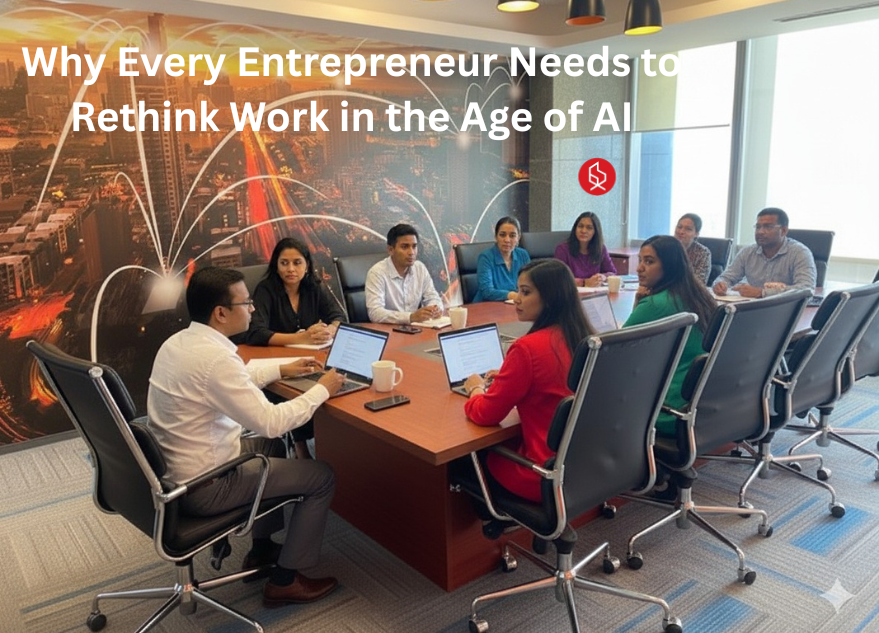Artificial Intelligence (AI) is no longer a distant concept it’s reshaping how businesses operate, innovate, and grow. For entrepreneurs, understanding the impact of AI on work is crucial to staying competitive and building sustainable ventures in the digital era.
💡 Are you looking for Coworking space in Gurgaon, Noida or Delhi? We are just a call away. Call Now: 08999 828282
10 Strategies for Entrepreneurs to Rethink Work in the AI Era
- The New Definition of Work in the AI Era
- Why Entrepreneurs Must Embrace AI, Not Fear It
- AI-Powered Decision Making: The New Entrepreneurial Superpower
- The Role of AI in Creating Smarter Business Models
- How AI Is Changing the Way We Build Teams
- Reimagining Customer Experience with AI
- The Rise of AI-Driven Productivity Tools
- New Opportunities: AI-Based Business Ideas
- Preparing for AI-Driven Job Shifts
- Ethics and Responsibility in AI Entrepreneurship
1. The New Definition of Work in the AI Era
AI is redefining what “work” means by automating repetitive tasks and creating new opportunities that demand creativity and strategic thinking. Entrepreneurs can now rely on AI tools to handle administrative tasks, freeing up time for innovation and leadership. This shift encourages founders to focus on higher-level problem-solving instead of routine operations. The integration of artificial intelligence in entrepreneurship marks a shift from effort-based productivity to intelligence-driven growth, enabling startups to scale smarter and faster than ever before.

2. Why Entrepreneurs Must Embrace AI, Not Fear It
Many business owners fear AI will replace human jobs, but in reality, it’s enhancing human potential. Entrepreneurs who embrace AI can streamline processes, personalize customer experiences, and make data-driven decisions. Instead of viewing AI as a threat, see it as a partner that amplifies your abilities. The impact of AI on work isn’t about replacement it’s about collaboration. Entrepreneurs who adapt early gain a competitive advantage and open new avenues for innovation and market leadership.
3. AI-Powered Decision Making: The New Entrepreneurial Superpower
Decision-making is one of the most critical skills for entrepreneurs. With AI-driven analytics, founders can now predict market trends, understand customer behavior, and minimize risks. Tools like predictive analytics and machine learning models help entrepreneurs make informed choices based on real-time data. In the age of AI and entrepreneurship, those who integrate intelligent systems can achieve faster growth and better accuracy in business strategies, leading to improved efficiency and profitability.
Also Read: How Entrepreneurs Can Unlock Hidden Potential for Success?
4. The Role of AI in Creating Smarter Business Models
AI is transforming traditional business models into adaptive, data-driven systems. Entrepreneurs are using AI to personalize services, automate marketing, and forecast demand with precision. For instance, e-commerce businesses leverage AI for product recommendations and inventory management. The future of work and AI lies in the ability to merge technology with human insight, enabling businesses to operate more intelligently and sustainably. Entrepreneurs must design business models that are flexible, digital-first, and ready to evolve with AI advancements.
5. How AI Is Changing the Way We Build Teams
In the AI era, team structures are evolving. Startups no longer need massive workforces; they need agile teams that work alongside AI tools. Recruitment platforms powered by AI can identify top talent faster, while chatbots can handle onboarding tasks. This evolution signifies a shift from manpower-heavy organizations to AI-driven entrepreneurial ecosystems where human creativity and machine precision work together. Entrepreneurs must learn to build hybrid teams that combine emotional intelligence with artificial intelligence.
6. Reimagining Customer Experience with AI
Customer expectations are higher than ever, and AI helps entrepreneurs meet them. From chatbots providing 24/7 support to personalized recommendations powered by machine learning, businesses can now offer faster, more tailored experiences. The impact of AI on work extends to customer interactions, where entrepreneurs can use sentiment analysis and predictive insights to anticipate needs. By leveraging AI, small businesses can compete with larger enterprises by delivering superior customer satisfaction.
7. The Rise of AI-Driven Productivity Tools
Productivity no longer depends on long working hours but on smart tools. AI applications like Notion AI, Jasper, and ChatGPT automate writing, planning, and analysis, saving entrepreneurs valuable time. These tools enable founders to work more strategically, focusing on creativity and business growth. The AI and future of work dynamic empowers entrepreneurs to operate leaner businesses with higher output. Embracing these tools helps startups stay agile, innovative, and competitive in fast-moving markets.
8. New Opportunities: AI-Based Business Ideas
AI has opened a world of entrepreneurial possibilities from AI-driven marketing agencies to predictive healthcare startups. Entrepreneurs can explore sectors like edtech, fintech, and e-commerce where artificial intelligence entrepreneurship is rapidly expanding. AI allows businesses to identify market gaps, automate delivery models, and offer personalized services at scale. By developing AI-based solutions, entrepreneurs not only stay relevant but also lead innovation in their industries, shaping the future of work and AI.
💡 Are you looking for Coworking space in Gurgaon, Noida or Delhi? We are just a call away. Call Now: 08999 828282
9. Preparing for AI-Driven Job Shifts
The AI and future jobs conversation is about transformation, not elimination. Entrepreneurs must prepare for new skill demands and emerging roles, such as AI trainers, data ethicists, and prompt engineers. Upskilling employees to work alongside AI tools ensures smoother transitions and sustained productivity. Business leaders who invest in AI education today will create more resilient, future-ready teams that thrive in the evolving digital economy.
10. Ethics and Responsibility in AI Entrepreneurship
With great power comes great responsibility. Entrepreneurs using AI must prioritize transparency, fairness, and accountability. Ethical AI use builds trust with customers and stakeholders while preventing biases and misuse. The future of artificial intelligence in entrepreneurship depends on maintaining human oversight and values. Founders who implement responsible AI practices not only protect their brand but also contribute to a more equitable and sustainable tech-driven world.
AI is reshaping the business landscape, and entrepreneurs must evolve to thrive. By integrating AI thoughtfully, business owners can unlock new levels of creativity, efficiency, and growth. The future of work and AI isn’t about machines replacing humans, it’s about empowering entrepreneurs to build smarter, more adaptive ventures. Those who embrace this change now will define the next era of innovation.
If you’re an entrepreneur or startup founder looking for a collaborative space to innovate, explore The Office Pass (TOP); a leading coworking network offering flexible, inspiring workspaces designed for productivity and growth. Call 8999 828282 to find your perfect workspace today.
Frequently Asked Questions (FAQs)
Question: How is AI changing entrepreneurship today?
Answer: AI is helping entrepreneurs automate tasks, analyze large data sets, and personalize customer experiences. It allows startups to operate efficiently and make smarter business decisions without needing massive resources.
Question: What are some examples of AI tools for entrepreneurs?
Answer: Popular tools include ChatGPT for content creation, HubSpot AI for marketing automation, and Tableau for data analytics. These tools help streamline daily operations and improve productivity.
Question: How does AI affect future jobs?
Answer: AI is transforming jobs rather than eliminating them. It automates routine work while creating new roles that require creativity, critical thinking, and technical skills.
Question: Why should small business owners invest in AI?
Answer: AI helps small businesses compete with larger companies by improving efficiency, reducing costs, and enhancing customer engagement through automation and insights.
Question: What industries are most impacted by AI?
Answer: AI is revolutionizing sectors like healthcare, education, finance, marketing, and e-commerce. Each industry uses AI differently, from predictive analytics to automation.
Question: Can AI improve decision-making for entrepreneurs?
Answer: Yes. AI uses data-driven insights to help entrepreneurs predict trends, identify risks, and make informed decisions, reducing uncertainty and boosting business performance.
Question: How can entrepreneurs prepare for AI-driven changes?
Answer: Entrepreneurs should focus on continuous learning, upskilling their teams, and adopting AI tools gradually to integrate them into existing business processes.
Question: What are the ethical challenges of AI in business?
Answer: Ethical concerns include data privacy, bias in algorithms, and transparency. Entrepreneurs must ensure responsible AI practices to maintain trust and fairness.
Question: Will AI replace human creativity?
Answer: No. While AI can generate ideas, true creativity comes from human imagination and emotion. AI supports creativity by handling repetitive work and offering inspiration.
Question: How can AI shape the future of entrepreneurship?
Answer: AI will drive smarter business models, enable personalized customer experiences, and open new markets. Entrepreneurs who adopt AI early will lead the next wave of global innovation.



